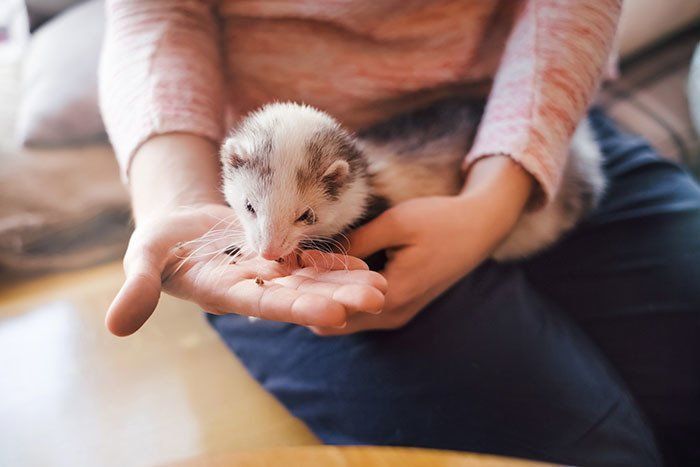4 Tips to Keep Your Ferret Safe and Healthy

Insanely clever, sometimes cuddly, and very cute, ferrets are one of the more common small exotic pets that have made their way into the American household. If you have decided to make a ferret a part of your family life, you must understand that exotic pets can be a little harder to care for if you want them to stay safe in the house and live a healthy life.
Part of the Mustelidae family just like weasels, ferrets have a natural life span of somewhere between 7 and 10
years, have specific dietary needs, and can be prone to certain diseases. To give your new ferret the best life possible, there are a few tips you should remember right from the time you bring your new exotic pet home.
1. Give Your Ferret Ample Time for Exercise
Your ferret will need a good, secure cage for sure, but this is not where the new pet should spend all of its time. Ferrets need plenty of exercise because they are highly active animals. A ferret that is caged too much can develop health issues and become a much less sociable animal. Make arrangements for the ferret to get at least two hours outside of the cage every day for exercise time.
2. Prepare Your Home to Keep the Ferret Safe
Many new ferret owners are taken aback by just how devious and crafty a ferret can be. The body of a ferret is slim, limber, and small, so these critters can slip into some of the most impossible places. Your ferret definitely needs its exercise, but the animal should only be allowed to free roam in a safe space. To create a safe, ferret-proof space, some risks you should eliminate include:
- Low-hanging electrical cords
- Open heating or cooling vents on the floor
- Gaps in windows or doors that lead to the outdoors
- Small items the ferret can get in their mouth (i.e., buttons, rubber doorstop covers, lids)
Keep in mind that ferrets naturally love to burrow and hide, so you do have to be careful about furniture in the space as well. Something like a recliner can seem like a perfect place for a ferret to burrow into a crevice and hide some food, but the ferret could be so well-hidden that they could get closed into the recliner and injured.
3. Set Aside a Budget for Vet Care for Your Ferret
In a ferret's lifetime, you could easily spend as much as $1,500 in vet care . These creatures are naturally prone to certain diseases (such as adrenal disease, insulinoma , and lymphoma) that have to have consistent monitoring, and regular checkups are an absolute must. Make sure you have a bit of money set aside specifically for preventative vet care and if your new pet shows signs of illness.
4. Get Familiar With the Proper Ferret Diet
Unlike a dog and more like a cat, ferrets have a high metabolic rate and need a high-protein food source. You can find food specifically formulated for ferrets that contains all of the necessary nutrients to keep your ferret healthy. Ferret food is usually in pellet form, almost like kitten chow. If you can't find ferret food in your area, kitten food with ample protein may be a good supplement.
Ferrets tend to eat smaller meals throughout the day instead of eating most of their food at one feeding. It's actually common for a ferret to eat 8 or 10 small meals. Therefore, keeping a small bowl of pellets out for your pet to eat at will is a good idea.
With a good care plan in place and a little instruction, a ferret can be one of the most fun and gregarious pets to have around. Reach out to us at
Pet Medical Center of Vero Beach
for more information about caring for your new ferret.





